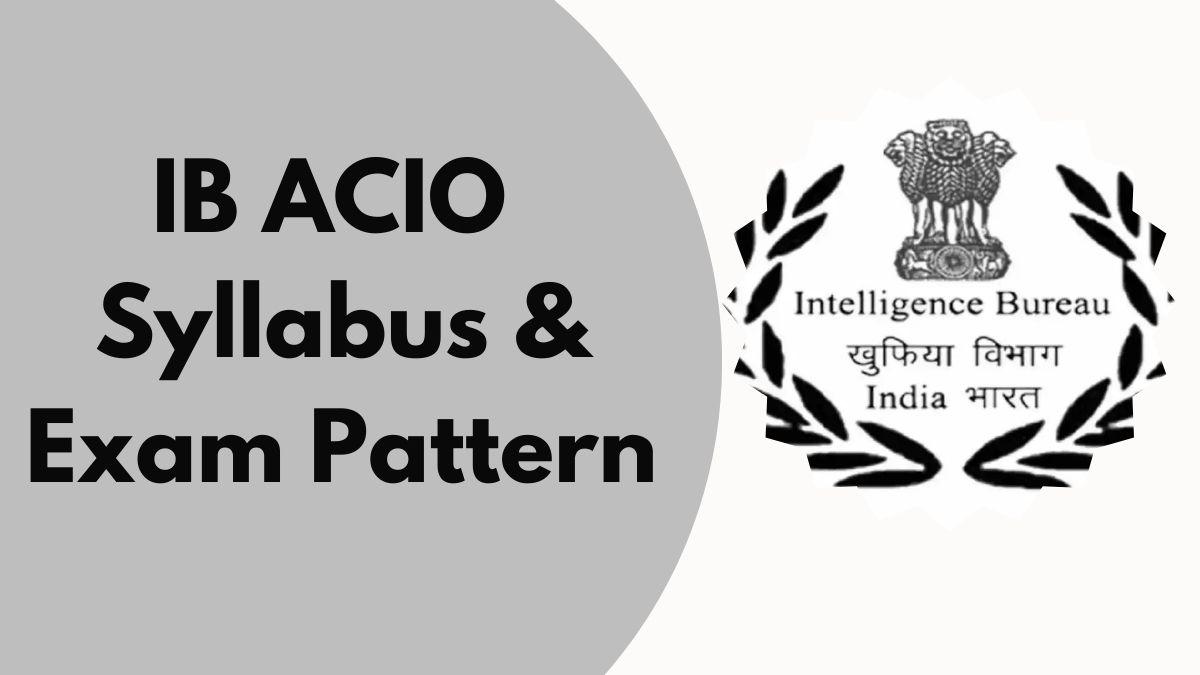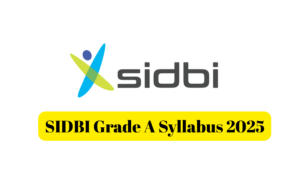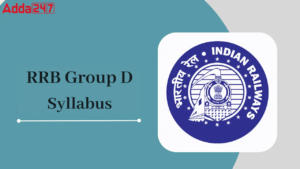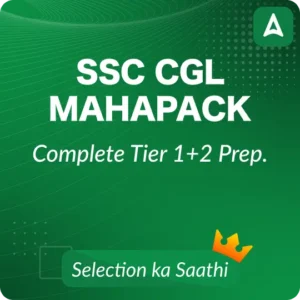Table of Contents
The Ministry of Home Affairs (MHA) conducts the IB ACIO Exam every year to recruit qualified candidates for the ACIO Grade-II Executive positions. To succeed in the exam, candidates need to understand the IB ACIO Syllabus 2025, which is categorised into five key sections: General Studies, Current Affairs, Quantitative Aptitude, Reasoning, and English. This article provides a detailed, section-wise breakdown of the IB ACIO Syllabus along with the complete exam pattern. Scroll down to view the full syllabus.
IB ACIO Syllabus 2025
Candidates preparing for the IB ACIO Recruitment 2025 should carefully review the detailed syllabus and exam pattern to plan their preparation effectively. For a clearer understanding, candidates can also refer to the key highlights provided in the table below.
| IB ACIO Grade II Syllabus 2025 | |
| Recruitment Authority | Ministry of Home Affairs |
| Organization Name | Intelligence Bureau (IB) |
| Post | ACIO Grade II/Executive |
| Category | Syllabus |
| Mode of Examination | Tier 1: Objective Type Tier 2: Descriptive Type |
| No. of Questions | Tier 1: 100 questions |
| Marks | Tier 1: 100 marks Tier 2: 50 marks |
| Official Website | mha.gov.in |
Follow the IB – ACIO 2025 channel on WhatsApp
IB ACIO Selection Process 2025
The IB ACIO 2025 selection process involves three stages: Tier 1, Tier 2, and Tier 3 (Interview). Candidates are required to qualify in each stage to progress to the next, and the final selection is determined by their cumulative performance and overall suitability for the position.
| Tier | Details |
| Tier 1 |
Objective (MCQ-based): Written test covering various subjects to assess general knowledge.
|
| Tier 2 |
Descriptive Written Exam: Requires essay-type answers; minimum 33% needed to qualify.
|
| Tier 3 |
Interview: Assesses personality, communication, and overall suitability for the role.
|
IB ACIO Exam Pattern 2025
The IB ACIO Written Exam will be held in two phases: Tier I, which is Objective in nature and Tier II, which is Descriptive. Candidates who will qualify for the Tier 1 and Tier 2 exams will be further called for the Interview round. After all the stages, the final merit list will be prepared, and selected candidates will be given the chance to join the Intelligence Bureau of India as Assistant Central Intelligence Officers.
IB ACIO Tier 1 Exam Pattern
- The IB ACIO Tier I Exam is a Written Exam of 100 Marks.
- For every wrong answer, there will be a negative marking of 1/4 mark.
- The Exam is Objective in nature and consists of MCQs.
- There are five subjects included in the Tier-1 exam.
- The time duration for this exam is 60 minutes.
| IB ACIO Tier-1 Exam Pattern | |||
| Subjects | No. of Questions | Marks | Time |
| Current Affairs | 20 | 20 |
1 Hour
|
| General Studies | 20 | 20 | |
|
Numerical Aptitude
|
20 | 20 | |
|
Reasoning and Logical Aptitude
|
20 | 20 | |
|
English Language
|
20 | 20 | |
| Total | 100 | 100 | |
IB ACIO Tier 2 Exam Pattern
- The phase 2 exam is descriptive.
- The paper is divided into two sections- Essay Writing and English Comprehension.
- The total mark for this paper is 50 marks.
- The exam duration is 60 minutes.
| IB ACIO Tier-2 Exam Pattern | ||
| Papers | Maximum Marks | Time |
| Essay | 20 | 1 Hour |
| English comprehension, 2 Long Answer Questions (10 marks each) on Current Affairs, Economics, Socio-political issues | 30 | |
| Total | 50 | |
IB ACIO Syllabus: Subject-wise
The IB ACIO Syllabus is divided into two tiers- Tier 1 and Tier. Candidates can check the detailed subject-wise syllabus below. It will help the candidates to prepare for their upcoming exams and streamline their study routine.
IB ACIO Tier 1 Syllabus
There are five main topics in the IB Assistant Central Intelligence Officer 2025 Tier 1 exam. These are:
- General Studies
- Numerical Ability
- English Language
- Quantitative Aptitude
- Current Affairs: National and International Current Affairs.
Check the detailed IB ACIO Syllabus Topic-wise below.
IB ACIO Syllabus for General Studies
Check the IB ACIO General Studies Syllabus in the table below, which includes topics like History, Geography, Polity, and others.
| Topics covered under General Studies | |
| History | Biology |
| Science & Technology |
Indian Polity & Constitution
|
| Geography | Physics |
| Current Affairs | Static GK |
| Economy & Finance | Chemistry |
IB ACIO Syllabus for Numerical Ability & Reasoning
The detailed topic-wise Syllabus has been tabulated below.
| Topics covered under Numerical Ability & Reasoning | |
| Alphanumeric Series |
Artificial Language
|
| Calendars | Clocks |
| Data Sufficiency | Directions |
| Odd One Out |
Order & Ranking
|
| Statement and Conclusions |
Reasoning Analogies
|
| Blood Relations |
Cause and Effect
|
| Coding-Decoding | Decision Making |
| Input-Output | Puzzles |
| Statement and Assumptions | — |
IB ACIO Syllabus for English Language
English is one of the easiest sections to score. The IB ACIO English Language Syllabus has been tabulated below for the convenience of the candidates.
| Topics covered under English Language | |
| Spellings | Correction |
| Improvement | Adjectives |
| Idioms and Phrases | Verbs |
| Fill in the blanks |
Synonyms/Antonyms
|
| Grammar |
One Word Substitution
|
| Verbal Comprehension Passage |
Detecting Mis-spelt words
|
| Passage | Clauses |
| Spot the error | Vocabulary |
| Sentence Structure | — |
IB ACIO Syllabus for Quantitative Aptitude
The Quantitative Aptitude section, if practised well, can be one of the easiest and best-scoring sections in the IB ACIO Exam. Check the detailed Syllabus for Quantitative Aptitude in the table below.
| Topics covered under Quantitative Aptitude | |
| Number systems | LCM and HCF |
| Mensuration | Percentage |
| Averages | Age |
| Fundamental Arithmetical Operations | Missing Numbers |
| Use of tables and graphs | Prices and Expenditure Problems |
| Relationship between numbers | Time and Work |
| Differential Geometry | Volume |
| Essential Mathematics | Fractions |
| Real Analysis | Ration and Time |
| Computation of Whole Numbers | Profit and loss |
| Ration and Proportion | Decimals |
| Discount | Operations Research & Linear Programming |
| Differential Equations | Dynamics |
| Analytical Geometry | Calculus |
| Ratios | Time and Distance |
| Factoring | Interest |
| Simple and Compound Interest | Algebra |
| Series Completion | Statistics |
IB ACIO Tier 2 Syllabus
The IB ACIO Tier 2 is a descriptive paper, comprising an Essay Writing section (20 marks) and an English Comprehension and Precis Writing section (30 marks). The topics for the Essay will be based on current affairs or any other news-related topics. Candidates can go through the IB ACIO Previous Year to get an idea of the IB ACIO Syllabus or topic for Tier 2.
IB ACIO Interview 2025
Candidates who will clear the cut-off for Phases 1 and 2 of the IB ACIO Exam will be called for the final stage of selection which is the IB ACIO Interview 2025. The Interview is held for 100 marks. The interview aims to assess the candidate’s suitability for a career in the Intelligence Bureau and evaluates the candidate’s personality, communication skills, and overall demeanor.
Important Note:
- Candidates will be shortlisted for Tier-II based on their performance and normalised marks in Tier-I. Around 10 times the number of total vacancies will be selected.
- Based on combined scores in Tier-I and Tier-II, candidates will be shortlisted for Tier-III (Interview) at 5 times the number of vacancies. To qualify for the interview, candidates must score at least 33% marks (17 out of 50) in Tier-II.
- The final merit list will be prepared based on the total marks obtained in Tier I, Tier II, and Tier III (Interview), according to the number of available vacancies.
How to Prepare for the IB ACIO 2025 Exam?
Candidates can prepare for the IB ACIO Exam 2025 by following the steps mentioned below.
- Understand the Exam Pattern: Know the structure of Tier I and Tier II exams and know the syllabus to guide your preparation.
- Stay Informed about Current Affairs: Regularly follow news sources, newspapers, and news channels to stay updated on national and international events.
- Improve General Awareness: Focus on history, geography, science, and politics, referring to reliable sources like NCERT books.
- Develop Analytical and Logical Reasoning Skills: Practice solving puzzles, coding-decoding problems, and questions related to logical reasoning.
- Enhance Quantitative Aptitude: Work on mathematical and quantitative skills, practising problems related to arithmetic, algebra, and data interpretation.
- Focus on English Language Skills: Improve reading comprehension, grammar, and vocabulary, and practice essay writing for the descriptive paper.
- Refer to Previous Year Question Papers: Solve past papers to understand the exam pattern and types of questions asked.
- Create a Study Schedule: Plan a study routine covering all topics, allocating dedicated time for each subject, and including breaks.
- Take Mock Tests: Regularly assess your preparation through mock tests, analyzing your performance and identifying areas for improvement.
- Revision is Key: Regularly revise to reinforce concepts and create concise notes for quick review.
| Links Related to IB ACIO | |
| IB ACIO Recruitment 2025 | IB ACIO Previous Year Question Paper |
| IB ACIO Salary | IB ACIO Cut Off |
| IB ACIO Apply Online 2025 | |




 SIDBI Grade A Syllabus 2025 And Exam Pat...
SIDBI Grade A Syllabus 2025 And Exam Pat...
 RRB Group D Syllabus 2025: Complete Subj...
RRB Group D Syllabus 2025: Complete Subj...
 RRB NTPC Syllabus 2025 for CBT 1 and 2, ...
RRB NTPC Syllabus 2025 for CBT 1 and 2, ...



